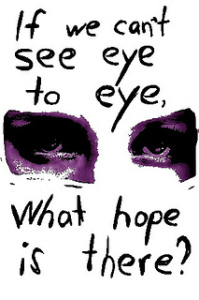 Compromise as a noun is described as an “agreement or a settlement of a dispute that is reached by each side making concessions – an ability to listen to two sides in a dispute, and devise a compromise acceptable to both.” As a verb it is “settle a dispute by mutual concession.” Nowadays it seems that people take the “my way or the highway” approach more often than not.
Compromise as a noun is described as an “agreement or a settlement of a dispute that is reached by each side making concessions – an ability to listen to two sides in a dispute, and devise a compromise acceptable to both.” As a verb it is “settle a dispute by mutual concession.” Nowadays it seems that people take the “my way or the highway” approach more often than not.
Why is it so important that we get our way? Is the art of compromise lost? As I was thinking about this, I was reminded of an incident this morning. I was driving on a residential street and a pedestrian entered a crosswalk in front of me, a man in his late 20s or early 30s. I stopped, (although there was no stop sign at this crosswalk), as pedestrians have the right of way. What I found annoying was that he never even glanced in either direction to see if traffic was coming, just assumed we would all stop for him. And this is not the first time I’ve seen this. In fact, over the past 5 years I think this is so commonplace I’m surprised there are not more injuries. The point is the sense of entitlement. The “I have the right of way, therefore you must stop” arrogance. As sound as this assumption might be, it really boggles my mind that one could be so absorbed as to think this is really how the world works.
I think it says a lot about why compromise is somewhat of a lost art. Walking across the street without checking to see that you are reasonably safe where traffic is involved is egocentric at the very least and unsafe at its worst. Is it merely all about each of us as individuals? Some think so. Just look at our deadlocked politicians who can’t get any laws passed because they are so set on their “point-of-view” that they refuse to see the other side and so nothing gets done. In these situations it’s difficult to understand why compromise could not solve the problem. I understand that where values are concerned, one usually will not make a change, but not taking any action can often make the situation worse.
If we separate what we believe and our ego, with what needs to get done, we can often see a path forward. From a leadership standpoint, this means going first and not waiting for someone else to offer up a solution. It involves finding out what is really important to the other side, what is non-negotiable and floating ideas for a middle ground. This requires discussion, listening, and questioning. Setting aside your “beliefs” about something for just a minute so that you might see things from another’s point-of-view. Abraham Lincoln was a master at compromise, as well as a great listener and storyteller. He knew that to be “right” meant that someone else was “wrong,” so he suspended judgment, listened, and found the middle ground that would serve the greater good and usually the majority.
Just for today, try letting go of the beliefs that keep you stuck and prevent you from seeing the other point-of-view. See if you can focus on the other perspective to achieve better solutions for long-term success. Just ask a few questions with genuine curiosity and you’ll be surprised at what you might discover. Compromise doesn’t have to be a lost art.
photo credit: Ken Whytock via photopin cc
